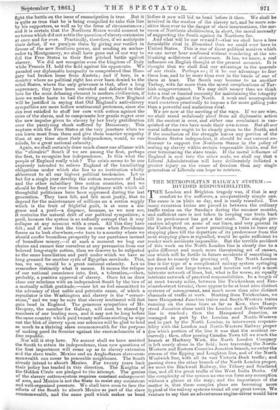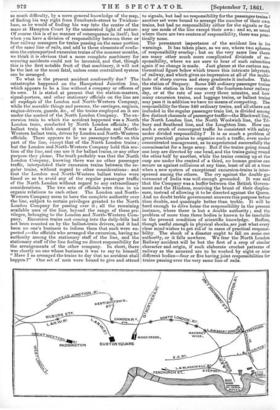THE METROPOLITAN RAILWAY SYSTEM :— DIVIDED RESPONSIBILITIES.
THE London and Brighton tragedy was, if that is any comfort to the sufferers, a comparatively simple one. The cause is as plain as day, and is easily remedied. Too many excursion trains are pieced in between the ordinary traffic trains on the Sundays during the summer months, and sufficient care is not taken in keeping one train back till its predecessor has got a fair start. The simple pre- caution adopted on some of our lines, and very general in the United States, of never permitting a train to leave any stopping place till the departure of its predecessor from the next stopping place is signalled, would be quite sufficient to render such accidents impossible. But the terrible accident of this week on the North London line is clearly due to a quite different and much more threatening set of causes, one which will be fertile in future accidents if something is not done to remedy the growing evil. The North London line is the type of a complicated railway system springing up round all our large towns, and involves not only a most intricate network of lines, but, what is far worse, an equally intricate network of practical responsibilities. In a length of at most twenty miles, between the Twickenham and Fen- church-street termini, there appear to be at least nine distinct systems of management, and much more than nine distinct channels of traffic at work. Starting from Twickenham, we have Hampstead Junction trains and South-Western trains running on the same lines as far as Kew, then Hamp- stead Junction alone until the London and North-Western line is reached ; then the Hampstead Junction, as managed in part by the London and North-Western and in part by the North London, in interwoven responsi- bility with the London and North-Western Railway proper (on which portion of the line it was that the accident oc- curred) ; then, after passing Camden Town till we reach the branch at Hackney Wick, the North London Company is left nearly alone in the field ; here traversing the North- Western and Eastern Counties Junction branch, we enterthe stream of the Epping and Loughton line, and of the North Woolwich line, with all its vast Victoria Dock traffic ; and passing down the other branch of the North London proper, we meet the Blackwell Railway, the Tilbury and Southend line, and all the great traffic of the West India Docks. Of the complexity of the system no one can form any conception without a glance at the map ; and the importance of the matter is, that these complex plans are becoming more typical of the railway systems round all our great towns. We venture to say that an adventurous engine-driver would hive as much difficulty, by a mere general knowledge of the map, of finding his way right from Fenchurch-street to Twicken- ham, as he would of finding his way into the centre of the maze at Hampton Court by the unassisted light of nature. Of course this is of no manner of consequence in itself; but when you have a division of responsibility between three or four railway managers for trains passing on the same portion of the same line of rails, and add to these elements of confu- sion the extemporized excursion trains of the summer months, we think it is obvious that a more complete machinery for securing accidents could not be invented, and that, though this is the first notable fruit of that machinery, it will not be the last or the most fatal, unless some centralized system can be arranged. To what is the present accident confessedly due ? The catastrophe happened on the Hampstead Junction line, which appears to be a line without a company or officers of its own. It is stated at present that the station-masters, signal-porters, and other stationary officials on the line are all employis of the London and North-Western Company, while the movable things and persons, the carriages, engines, engine-drivers, guards, &c., of the trains employed on it are under the control of the North London Company. The ex- cursion train to which the accident happened was a North London train, conducted by North London officials ; the ballast train which caused it was a London and North- Western ballast train, driven by London and North-Western officials. There appears to be no passenger traffic on this part of the line, except that of the North London trains ; but the London and North-Western Company hold this sec- tion of the line, and can use it for ballast trains, or any other purpose they please. The truth probably was that the North London Company, knowing there was no other passenger traffic, interpolated their excursion trains between the re- gular trains, without regard to other considerations : and that the London and North-Western ballast trains were timed so as to avoid any of the regular passenger traffic of the North London without regard to any extraordinary considerations. The two sets of officials were thus in no organic relations to each other. The London and North- Western Company seem to have the complete authority over the line, subject to certain privileges granted to the North London Company for passing over it ; all the remaining available uses of the line, beyond the range of these pri- vileges, belonging to the London and North-Western Com- pany. Excursion trains not coming into the daily-bills had not been counted on by the ballast-train drivers, and it had been no one's business to inform them that such were ex- pected ;—the officials who arranged the excursion, having no authority among the stationary staff of the line, and the stationary staff of the line feeling no direct responsibility for the arrangements of the other company. In short, there was clearly no one whose business it was to say to himself, " Have I so arranged the trains to day that no accident shall happen ?" One set of men were bound to give and attend to signals, but had no responsibility for the passenger trains ; another set were bound to arrange the number of their own trains, but had no responsibility either for the signals or for any use made of the line except their own : and so, as usual where there are two centres of responsibility, there was prac- tically none. The permanent importance of the accident lies in its warnings. It has taken place, as we see, where two spheres of responsibility overlap : but on the very same line there are many other much more complicated divisions of re- sponsibility, where we are sure to hear of such calamities again if no change is made. Just glance at the curious ma- thematical figure below which traces this intricate labyrinth of railway, and which gives no impression at all of the multi- tude of sharp curves and steep gradients it includes. Take the station of Stepney. Some 340 ordinary passenger trains pass this station in the course of the fourteen-hour railway day, or at the rate of one every three minutes, and how many excursion trains, and luggage trains, or ballast trains may pass it in addition we have no means of computing. The responsibility for these 340 ordinary trains, and all others not included in the regular passenger train list, is divided among five distinct channels of passenger traffic—the Blackwell line, the North London line, the North Woolwich line, the Til- bury and Southend line, and the Loughton line. How can such a crush of convergent traffic be consistent with safety under divided responsibility ? It is as much a problem of great practical genius to organize such a traffic, even under concentrated management, as to superintend successfully the commissariat for a large army. But if the trains going round one loop are directed by one head, and the trains going round the other half by another, while the trains coming up at the cusp are under the control of a third, no human genius can secure us against collisions at any time, least of all at a time when a new system of exceptional excursion-trains is inter- spersed among the others. The cry against the double go- vernment of India was well enough grounded. It was said that the Company was a buffer between the British Govern- ment and the Hindoos, receiving the brunt of their displea- sure, instead of allowing it to be directed against the Queen. And no doubt treble government answers this purpose better than double, and quadruple better than treble. It will be hard enough to drive home the responsibility in the present instance, where there is but a double authority ; and the problem of more than three bodies is known to be insoluble in the present condition of scientific knowledge. Buffers, though useful enough in physical shocks, are just what every clear mind wishes to get rid of in cases of practical responsi- bility. The shock of a disaster ought to fall on some one authority, or it falls nowhere. We fear the North London Railway accident will be but the first of a crop of similar character and origin, if such elaborate crochet patterns of railway as the annexed are to be worked by eight or nine different bodies—four or five having joint responsibilities for trains passing over the very same line of rails.































 Previous page
Previous page